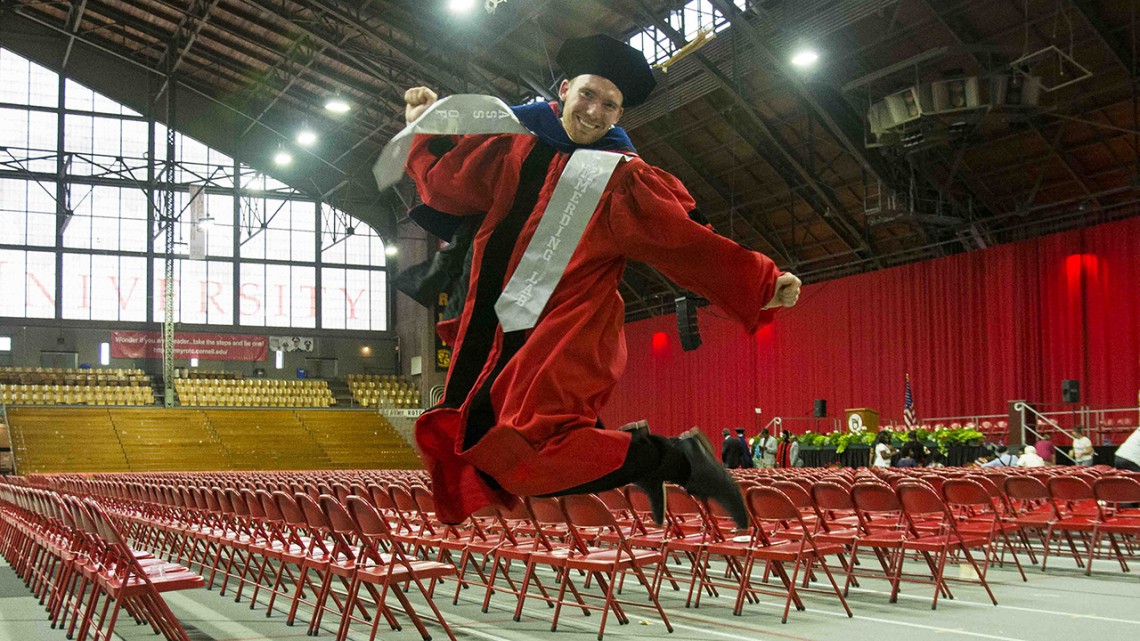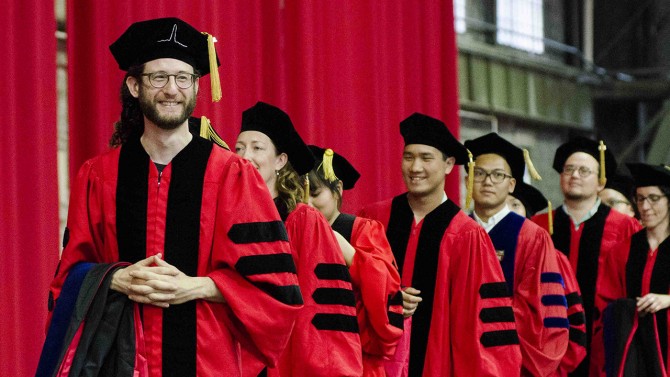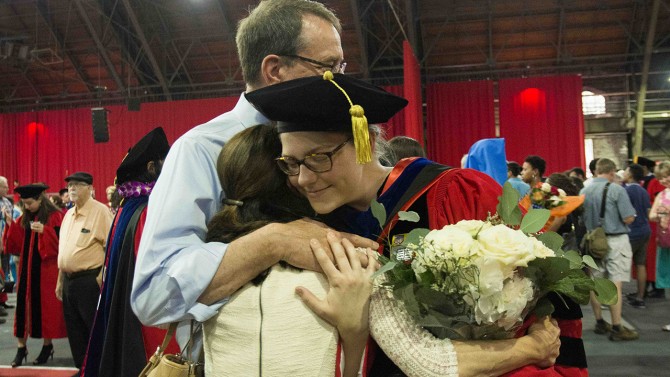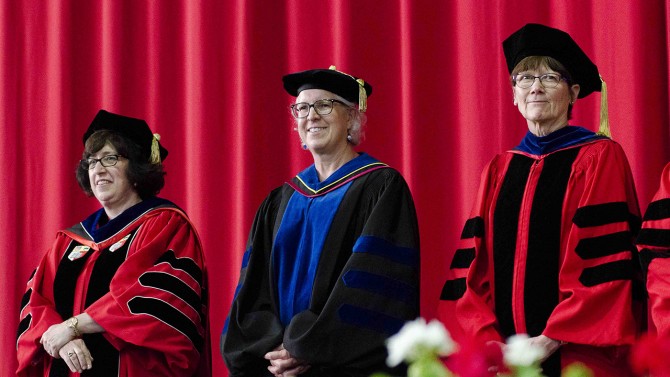
Gregory Fedorchak jumps for joy following the Ph.D. Hooding Ceremony May 26 at Barton Hall.
Pollack lauds Ph.D. evidence-based expertise at hooding ceremony
By Nancy Doolittle
Cornell’s newly minted Ph.D.s are experts on DNA integrity and human genomes, tsunamis, maternity, violent extremism, poverty and food security. Some of them are authorities on Minoan dining or the Carolingian Empire, while others are specialists in sustainable change, fashion, real estate, culture or robotics.
Their scholarly achievements were recognized May 26 at the Ph.D. Hooding Ceremony in Barton Hall; their degrees will be conferred May 27 at Commencement.
“Today, you – each of you – is the world’s expert on whatever topic you wrote about in your dissertation,” said President Martha E. Pollack. “There are 7.6 billion people in the world, and you know more about X (fill in the blank with your dissertation topic) than anyone else – including, almost certainly, any single member of your dissertation committee.”
Regardless of their subject area, “You have also learned how to rigorously test and challenge ideas, and then how to defend those ideas and show that they stand up to the evidence,” Pollack told the candidates. “Your expertise is built not just on what you know, but on how you know it – that is, on your hard-gained ability to look critically at alternative ideas and make principled assessments of them.”
Pollack said the ability to recognize the difference between truth, strongly supported hypotheses, weakly supported hypotheses and falsity is more important than ever. She said students receiving Ph.D.s know how to build an evidence-based defense for their ideas, while also realizing that “knowledge advances by successive approximations and is always open to revision and refinement in the face of new and stronger evidence.”
Pollack recognized the families, friends and others who helped Ph.D. candidates achieve their degrees and urged the candidates to maintain contact “with those to whom you’ve become close” while at the university.
She also noted that the career trajectory of Ph.D. recipients has changed over the years. While many still head into academia, an increasing number go on to work in industry, government, nonprofits or the media, or become entrepreneurs. About 95 percent of Cornell’s Ph.D. recipients work in a field closely related to their degree, she said.
Some candidates went directly from undergraduate to graduate studies, such as Suzanne Pierre, who became excited about soil biogeochemistry and ecosystem change while working in a laboratory in 2012. She received her B.A. in environmental studies in 2013 from New York University and began the Ph.D. program in the field of ecology and evolutionary biology at Cornell a few months later. Helen Trejo received both her M.A. and Ph.D. at Cornell, became interested in local fibers such as wool, alpaca and mohair during her graduate research, and has devoted the past five years to exploring the intersections of fashion and agriculture in New York City.
Others, such as Susan Coombe ’80, who has attained her Ph.D. in pharmacology, had careers and families before attaining a doctorate. Coombe is the widow of George Hess, professor emeritus of biochemistry in the Department of Molecular Biology and Genetics; her son, Peter Hess, is a professor in Cornell’s Department of Biological and Environmental Engineering; and her daughter-in-law, Natalie Mahowald, is the Irving Porter Church Professor of Engineering in the Department of Earth and Atmospheric Sciences.
Still others have pursued degrees in topics of concern in their country of origin. Evageniya Nazarova came to Cornell from Russia to study tuberculosis in the lab of microbiology and immunology professor David Russell, while Juan Nicolas Hernandez-Aguilera, originally from Colombia, concentrated on sustainable agriculture, specifically studying coffee and other tropical plants for his doctorate in applied economics and management.
Pollack challenged the graduates to “be a proud expert in your own discipline, and model the principles of scholarship in everything you do” and to “… bring the passion you have shown in your doctoral work to all your professional endeavors and your personal endeavors as well.”
Media Contact
Get Cornell news delivered right to your inbox.
Subscribe







